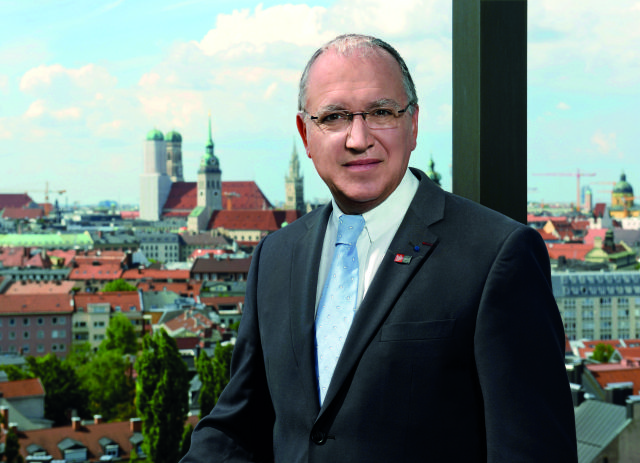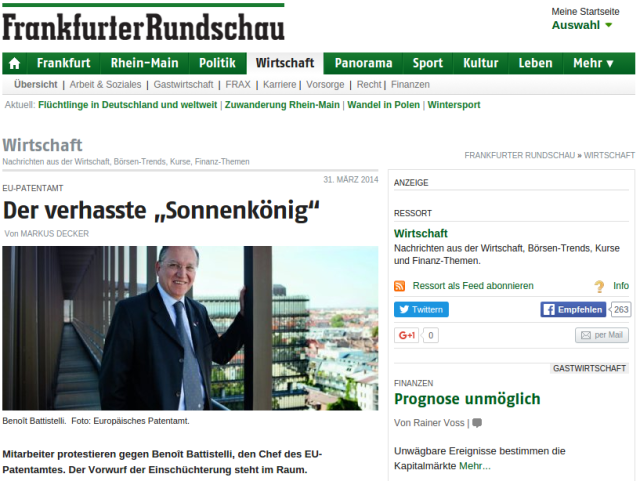The battle for EPOnia
The struggle for the soul of EPOnia began when a new monarch was installed in the little kingdom, which has its capital in Munich, a major colony in The Hague, as well as smaller outposts in Berlin and Vienna. In March 2010, the Frenchman Benoît Battistelli was elected as EPO President, the top post of the executive arm of the EPO. Before that, he was head of the French patent office, after holding various posts in French government departments and embassies.
It seems that one of his key goals is to modernise the EPO, and that includes changing the rules under which the workforce operates. An EPO spokesperson explained to Ars the reason for the revision: "The internal structure of the EPO, including the staff rules, are dating mostly from the 1970s, and do no longer properly support the need of the [European Patent] Office to be successful in an increasingly competitive environment."

By virtue of EPOnia's diplomatic immunity, local labour laws don't apply, and employees don't enjoy the usual EU protections. That's why the alleged case of assault that took place in the EPO 20 years ago had to be taken to the International Labour Organisation (ILO)—where it was thrown out on the grounds that ILO's power stopped at the borders of EPOnia.
However, compensating that lack of employment rights are some very generous salaries for those who work at the EPO: the organisation's "2014 Social Report" notes that the top 10 percent earn £100,000 or more, while only the bottom 10 percent earn £50,000 or less. According to an article in the German newspaper Süddeutsche Zeitung, salaries are exempt from national taxation, but are subject to an internal tax of 6 percent, which helps defray the running costs of the EPO.
Employees enjoy three months a basic 30 days holiday a year, all their medical costs and children's education fees are paid by the EPO, and they can retire at 50 years of age on a substantially-reduced pension, and at around 62 years of age with a full pension.
Those benefits makes working at the EPO an attractive option for those willing to enter this strange world. The EPO says: "In 2014 we had 200 job offers for patent examiners, with 20,000 candidates applying." As a result, the EPO is the second-largest intergovernmental institution in Europe, after the European Commission, employing approximately 7,000 people in total. Around half of them belong to the main union, SUEPO (Staff Union of the European Patent Office), which records in great detail its struggle against Battistelli and his attempts to reform the EPO.
Battistelli began with major changes to when and how EPO staff were allowed to organise strikes. A spokesperson for the EPO told Ars:
"The internal legal framework so far did not account for important elements of social dialogue, such as the right for industrial actions. There was a clear need to remedy those regulatory deficits for the well-functioning of the EPO on the basis of transparent internal rules and structures which also account for a clear role and responsibilities of trade unions for instance. The EPO is now in a process of establishing legal recognition of trade unions."
"The hated Sun King"
That's not how SUEPO sees things. In a letter to the governments of the EPO member states, SUEPO wrote: "Since Mr Battistelli joined the EPO as President, a series of changes to the Service Regulations have been introduced which ... have led to a situation where no effective legal protection of staff rights exists." This led to a strike in October 2013, timed to coincide with the 40th anniversary of the signing of the European Patent Convention.
Matters didn't improve in early 2014, when 90 percent of the 4,000 votes cast by EPO staff supported another round of strikes, which took place in March and April of that year. At the time, SUEPO released a summary of what it saw as the chief problems besetting EPO. Here are three of them to give an idea of the atmosphere in EPOnia:
The President has created his own internal police and introduced so-called “Investigation Guidelines” that encourage staff to report on each other and that deny staff fundamental rights such as the right to remain silent, the right to be represented by a legal counsel of one's choice, and the right to refuse access to one's home without a search warrant.
Mr Battistelli strongly curtailed the communication means of the Staff Union of the EPO (SUEPO) and of the Staff Committee. Incoming emails sent from the SUEPO domain are blocked, the sending of emails to more than 50 colleagues is forbidden and punished with disciplinary measures. Documents submitted for the Administrative Council are blocked by the President.
Mr Battistelli introduced strike regulations that give him the power to decide for what issues staff may strike and for what they may not. Strike ballots may no longer be organized by the Staff Union but only by the administration. All other actions than strike (e.g. work-by-rule) have been declared illegal.
Two articles that appeared in leading German newspapers around this time both referred to Battistelli by his nickname within EPOnia: "the Sun King"—a reference to the absolutist French monarch Louis XIV. One even goes so far as to call him "the hated Sun King." In that same article, Battistelli was quoted as saying: "In my view, we are at the peak of the conflict. I'm sure that in six months' time, things will look different." But he was wrong: things became worse, not better, as word began to spread about the goings-on in EPOnia.

In April 2014, a Member of the European Parliament asked the European Commission what powers it had to intervene in the deteriorating EPO situation. But like the ILO, an otherwise powerful organisation had to admit its impotence: "The Commission is aware of the press reports concerning the changes in the internal rules of the European Patent Office (EPO) affecting inter alia the staff representation. The Commission, however, is not in a position to assess the content of these reports as the EPO is a body of the European Patent Organisation—an international organisation established by the European Patent Convention (EPC) and entirely separate from the European Union."
Questions were also asked in the Italian, French and Dutch parliaments. A French MP wrote an editorial in which he spoke of "anachronistic management practices, which are without parallel in the history of an international organisation."
Another round of strikes by EPO staff was called for November and December 2014. In a sign of escalating tensions, some street demonstrations were held on the strike days. SUEPO reported: "On Tuesday 2 December, in The Hague some 600 employees demonstrated in front of the French embassy. From there they marched towards the Danish embassy. On the same day in Munich an overwhelming 1350 employees, some with their families, gathered in front of the Pschorrhöfe building, making this the largest demonstration ever in the history of the Office."
In addition to their earlier complaints, "a group of concerned staff of the EPO who wish to remain anonymous due to the prevailing harsh social climate and absence of rule of law at the European Patent Office" published an open letter raising another issue. Under a proposed "New Career System," the letter noted, "Securing attractive remuneration will rely on maintaining an individual advantage in competition with colleagues, by comparison of production."
In other words, quantity might start to count more than quality, leading to a greater number of poorer-quality patents being issued. According to the EPO's spokesperson, in 2015 "4,200 patent examiners delivered a record total of 365,000 'products' (such as searches and examinations), an increase of 14% compared to 2014."
The "concerned staff" of the EPO feared the consequences of a drive towards greater numbers of lower-quality patents being issued would be serious: "Low quality patents will harm business, primarily SMEs, private inventors and Universities, since the legal costs for an infringement and/or litigation procedure are so high that they normally threaten their financial foundation."
reader comments
18